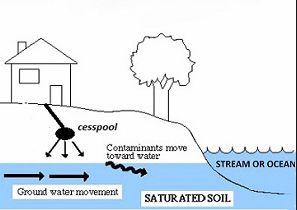 Did you know that cesspools in Hawai`i release approximately 55 million gallons of untreated sewage into the ground each day? Cesspools in Hawai`i release as much as 23,700 pounds of nitrogen and nearly 6,000 pounds of phosphorus into the ground each day, which can stimulate undesirable algae growth, degrade water quality, and impact coral reefs.
Did you know that cesspools in Hawai`i release approximately 55 million gallons of untreated sewage into the ground each day? Cesspools in Hawai`i release as much as 23,700 pounds of nitrogen and nearly 6,000 pounds of phosphorus into the ground each day, which can stimulate undesirable algae growth, degrade water quality, and impact coral reefs.
It is due to this threat to our local environment and to our bays and beaches that the state of Hawaii created Wastewater System rules banning new cesspools statewide. Hawaii has been the only state in the country that allows new cesspools. The banning of new cesspools statewide stops the addition of pollution from approximately 800 new cesspools per year.
House Bill 1244, if signed by the governor, will revise existing statutes to require that every cesspool in the state, unless exempted, “shall be upgraded or converted to a septic system or aerobic-treatment unit system, or connected to a sewage system” by Jan. 1, 2050.
Hawaii County has been under the magnifying glass of the U.S. Environmental Protection Agency since a 2005 cesspool ban went into effect. The EPA is especially concerned with the large-capacity community cesspools in Pahala and Naalehu.
This bill, if passed, will affect homeowners on the Big Island who will have to upgrade their existing cesspools and buyers who purchase real estate with cesspools that need the required retrofit. Under the law, owners of cesspools located within 200 feet of the ocean, streams or marsh areas, or near drinking water sources can qualify for a tax credit or Act 120.
What is Act 120?
Act 120 provides a temporary income tax credit for the cost of upgrading or converting a qualified cesspool to a septic tank system or an aerobic treatment unit system, or connecting to a sewer system. A taxpayer may apply for a tax credit of up to $10,000 for each qualified cesspool. The tax credit starts in tax year 2016 and ends in tax year 2020, December 31, 2020. There is a $5,000,000 cap that is available for each tax year. Any taxpayer who is not eligible to claim the credit in a taxable year shall be eligible to claim the credit in the subsequent taxable years from 2017 to 2020.
What are cesspools?

- Cesspools are little more than holes in the ground that discharge raw, untreated human waste.
- Cesspools can contaminate ground water, drinking water sources, streams and oceans with disease-causing pathogens, algae-causing nutrients, and other harmful substances.
- Untreated wastewater from cesspools contains pathogens such as bacteria, protozoa and viruses that can cause gastroenteritis, Hepatitis A, conjunctivitis, leptospirosis, salmonellosis and cholera.
How many cesspools do we have in Hawai`i?
- There are approximately 90,000 cesspools in the State, with nearly 50,000 located on the Big Island, almost 14,000 on Kauai, over 12,000 on Maui, over 11,000 on Oahu and over 1,400 on Molokai.
- Hawai`i is the only state in the US that still allows construction of new cesspools.
Even with the additional costs of upgrading cesspools to septic systems and maybe the eventual connection to a sewage system, it saves our drinking water and our fragile ecosystem from pollution.
A working cesspool or septic tank is essential if your home is not connected to the public sewage system, which many homes lack on Hawaii Island, especially in rural areas such as Pahala and Naalehu, where investors consider development. Upgraded systems will help keep waste out of the local groundwater.
LUVA Real Estate agents work to stay informed of local legislation that may affect home buyers and sellers like House Bill 1244. If you have questions about land use rules or other factors affecting our local real estate market, please contact us today.